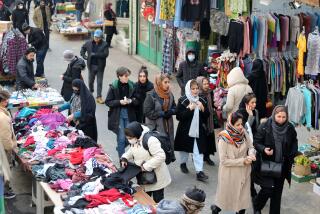Iran’s Bond Sale Draws Attention in Europe
- Share via
LONDON — Iran’s first foreign bond sale since the Islamic revolution of 1979 is attracting interest from Deutsche Bank, Pictet & Cie and other banks that aren’t put off by the nation’s place in President Bush’s “axis of evil.”
Money managers who met with Iranian officials this week in Frankfurt and Paris say they may buy some of the $492 million in securities underwritten by BNP Paribas and Commerzbank.
“Nobody in Germany or continental Europe agrees with Bush,” said Holger Friedrich, who manages about $530 million in securities at Union Investment, Germany’s No. 3 fund manager.
Many European money managers are ignoring Bush’s January statement that Iran, along with Iraq and North Korea, supports terrorists like those that attacked the World Trade Center and the Pentagon on Sept. 11. Instead, they say the country’s oil and history of repaying debts make it more trustworthy than emerging market alternatives such as Brazil, Turkey and Argentina.
For some U.S. investors, European willingness to invest in countries accused of sponsoring terrorism is abhorrent, particularly after the attack on New York’s financial district.
“I lost friends on that day,” said Stapley Mitchell, who oversees $4 billion at Fifth Third Investment Advisors in Grand Rapids, Mich. “I don’t care how much money you can make; these are people that are trying to kill.”
Frank Scheidig, who oversees investment services for Deutsche Asset Management’s governmental clients, said there is no evidence Iran supported the attacks on the U.S. After meeting with Iran’s deputy central bank governor, Mohammad Mojarrad, on Tuesday, Scheidig said he may recommend that investors buy the bonds.
“If there was the smallest confirmation that they supported Sept. 11, I wouldn’t ever” invest there, Scheidig said.
“With my knowledge, we would never spend a cent on any investment in a country that would do something bad.”
Iran plans to sell the five-year bonds to yield 3.75 to 4.25 percentage points more than the so-called mid-swap rate, a benchmark for corporate borrowing, said Dominique Audin, who helps manage $60 million in securities for Pictet Asset Management in London.
Some investors said Iran needs to pay higher returns because the U.S. sanctions make it a bigger risk.
“You can’t argue that Iran has as good credit as Russia,” Audin said. “Russia isn’t being pointed at by the U.S. president as a potential target.”
More to Read
Inside the business of entertainment
The Wide Shot brings you news, analysis and insights on everything from streaming wars to production — and what it all means for the future.
You may occasionally receive promotional content from the Los Angeles Times.









